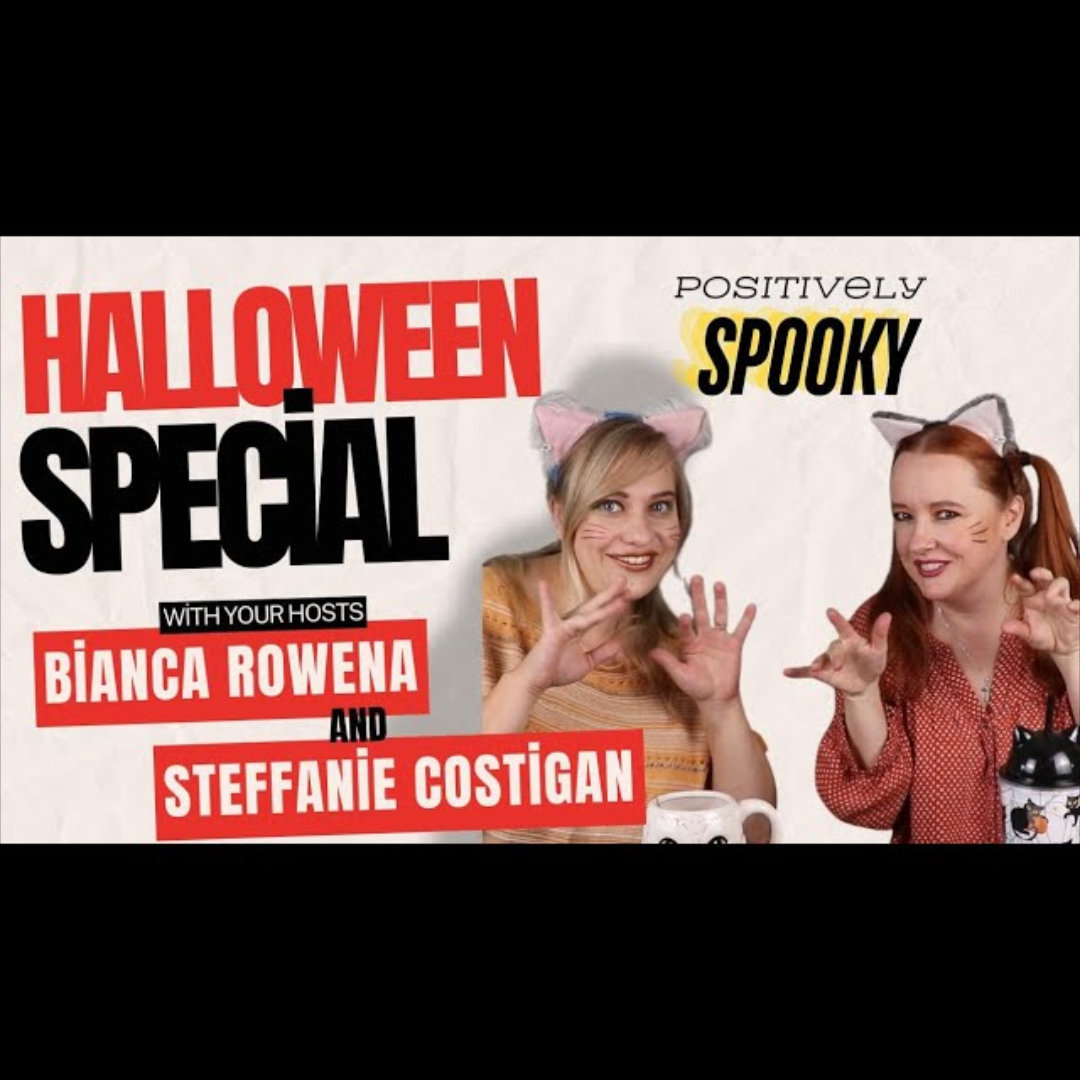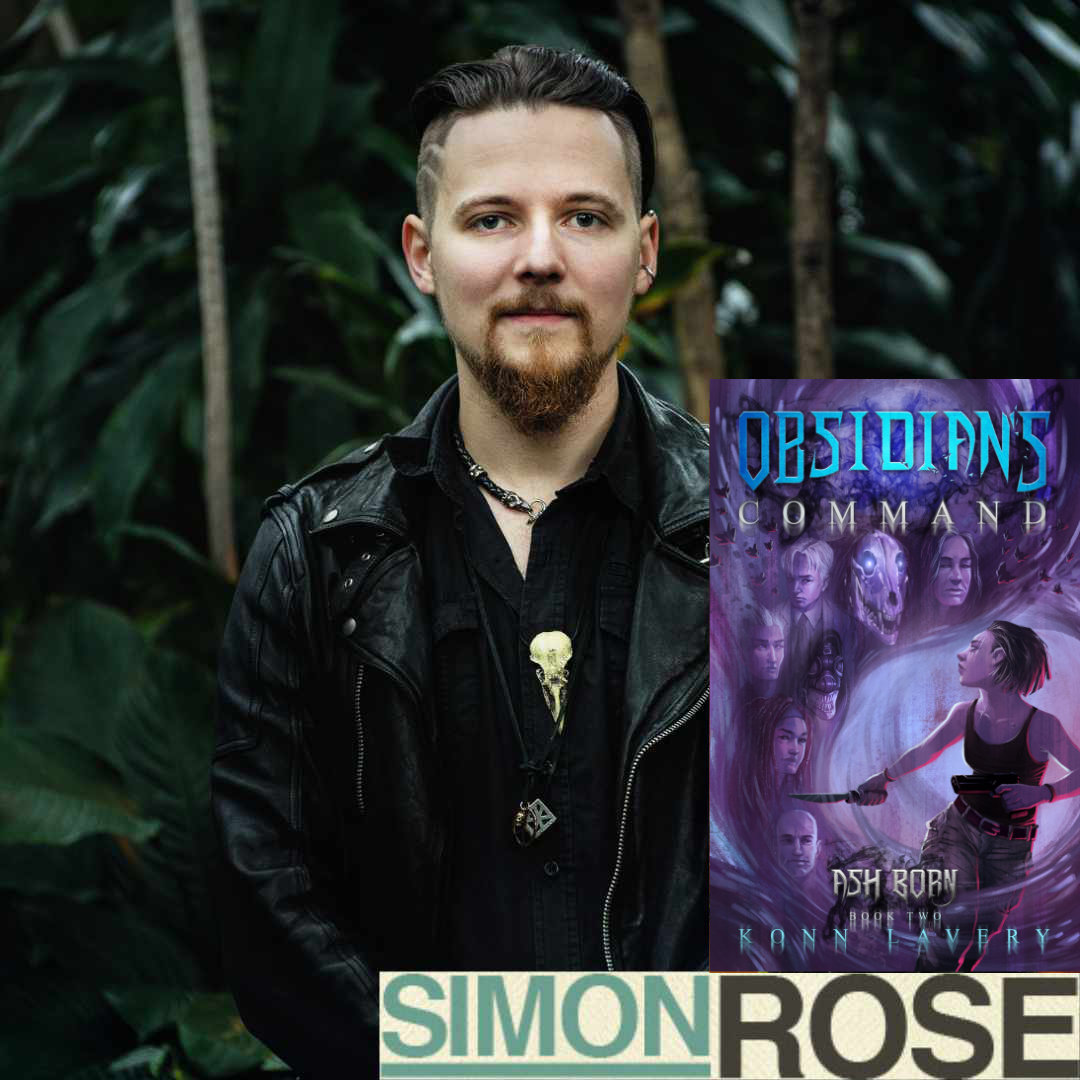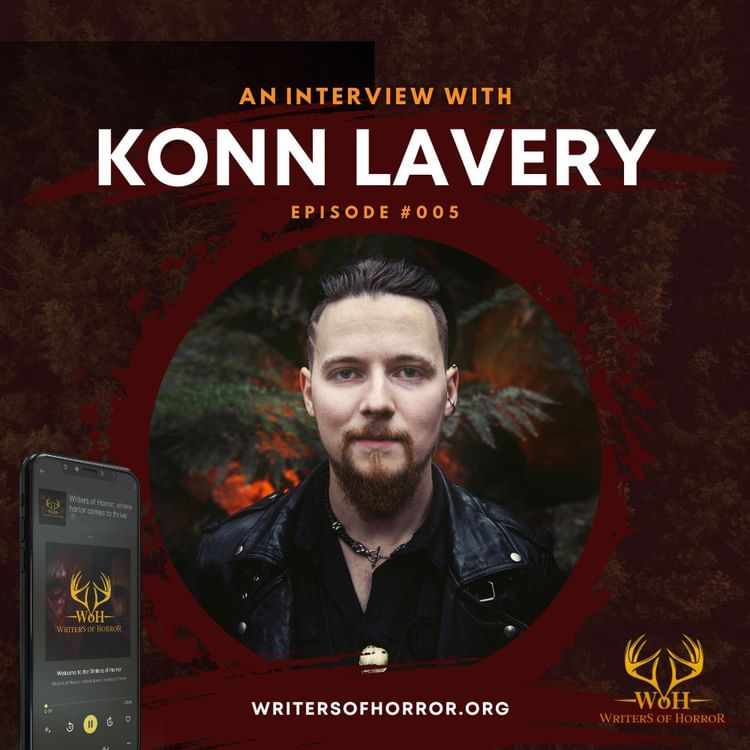Interview with Horror Author Matthew Gillies
Estimated Reading Time:
Matthew Gillies and I first met at the Edmonton Comic Expo as mentioned in a previous blog post, where we had connected through a mutual passion of writing, horror and graphic design. Matthew was willing to spend some time with me and discuss his own writing interests and experiences.
Currently I have two of Matthew’s novels, his debut novel The Electric Coma Dream (horror) and Oblivious Paradise (Sci-Fi). I am currently reading Oblivious Paradise and within the first 80 pages I have been roped into kidnapping, shredded flesh and cannibalism. Awesome! With an intro like that, who needs sleep? Without further ado, let me introduce the guest of the blog, Matthew Gillies.
Matthew, tell us a bit about yourself and your writing.
How I like to describe myself is: my name isn’t synonymous with horror. Not in the way that Edgar Allan Poe is known as the father of horror, H.P.Lovecraft as the godfather of weird, Stephen King as the master of the supernatural and Clive Barker as the anarchic prince of horror, but one thing is true… I am horrors’ newest disciple.
There is a reason I like to call myself the newest disciple. Horror fiction can be a large genre which encompasses a multitude of subgenres, such as Splatterpunk, Gothic Horror, Supernatural and so on. I prefer to call myself a disciple because I am not redefining horror. I am not looking to reinvent the wheel. I am simply a follower of the philosophy that makes up horror.
Myself in general, I’ve dedicated myself to professional writing for the last fifteen years – having written a number of manuscripts, published two short stories, four novels, with two more slated for release in 2016 and 2017. So I’ve been at it for quite some time now.
Give us an introduction to your debut novel The Electric Coma Dream.
The Electric Coma Dream is a surreal psychological horror novel about a young woman who slips into a coma after overdosing on heroin, only to emerge inside her desecrated mind. It is there, where she encounters the personifications of her inner-self and has to come to terms with her life; past, present and future.
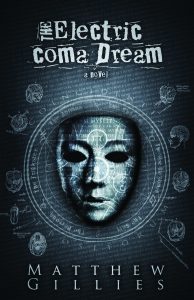 Mathew’s debut novel, The Electric Coma Dream
Mathew’s debut novel, The Electric Coma Dream
Who is your favourite character in this story and why?
My personal favourite would have to be Anastasia, the protagonist of the novel. The reason for it is when I wrote Anastasia, she acted as a kind of trauma sponge for me. She allowed me to channel all the emotions I felt through her – the feelings of alienation, self-destructive tendencies and the search for an identity.
Anastasia acted in a sense as a conduit to express those feelings that seemed so hard to understand. She was a character that experienced so much hardship… so much emotional confusion that she became a character that was relatable… someone to who could tell any reader that they were not alone in how they feel.
The other reason I enjoy her so much, is throughout the novel you see her develop from a timid naïve girl to a confident woman trying to get her life in order and no matter how much suffering she endures, she does not give up.
Is this your first manuscript/story written?
The Electric Coma Dream is actually the third novel I ever wrote. The first being a novel called The Experiment (formerly known as Psychotica). The Experiment was written 15 years ago and it was because of this novel that I came up with The Electric Coma Dream.
I was really fascinated with the Kafkaesque device of a character finding themselves in a strange and peculiar situation with no explanation as to why they got there and because of that, The Experiment was about a young man who finds himself inside a psychiatric hospital with no memory of why he was there – but during his time in the facility, he slips in and out of reality, where one second he is bound in a straight-jacket and left in a rubber room, and then the next, he’s in this dark fantasy world being stalked by hideous creatures.
Your first novel does fall under the horror genre, is this your favourite genre to write?
The horror genre is by far my favourite genre. It is so liberating to write horror because anything can happen in it. Severed heads can sprout legs and tentacles and crawl across your bed, and all you need to do to make it convincing is create a well-thought out mythology for the creature. And even if you don’t do that, it makes the story even more terrifying because no one knows what the hell that severed head is or what it is doing and that is the most frightening thing.
But yes, The Electric Coma Dream is a novel that falls into the horror genre… but in a different sense of horror. While a lot of horror novels want to write about monsters and tackle issues with gore and blood, The Electric Coma Dream handles horror differently. It examines the psychological nature of a character (Anastasia) who is losing control of her life chapter by chapter and does not know how to stop the rollercoaster of psychological torment.
How do you tackle clichés?
Clichés are almost unavoidable, not just with horror but with any kind of fiction writing. They’ve become the trope in which the foundation of formulaic writing is based upon and I do everything in my power to avoid clichés – particularly in dialogue and actions. If I start writing something that makes me cringe because it seems like it’s been done before, I challenge myself to write something completely different.
The problem is, sometimes when it comes to plot, it’s unavoidable. For instance, when I first wrote Oblivious Paradise, I wrote it as a sequel to my second novel ever written (The Pig Factory), which both dealt with a deadly virus that wipes out humanity. When I first wrote those two novels, the post-apocalyptic plot device wasn’t as popular as it is now.
Then suddenly, there was this influx of post-apocalyptic novels – especially within the YA genre. But instead of viewing this a negative thing, it tells me there is a market for the type of novels I’ve written, which don’t necessarily follow the typical format of commercial fiction. In fact, I’ve seen that with how popular The Electric Coma Dream has become.
Do you find there are challenges to overcome with writing horror that is different than other genres?
There are always challenges with writing any genre. For me, horror can become a challenge if you try to write something you expect people to expect. I think there’s an expectation that when someone writes a horror novel that it has to have some kind of supernatural evil or excessive gore to give it that kind of moniker.
For The Electric Coma Dream, it has its moment of excessive violence, but it doesn’t rely on the shock factor to make it horror. Rather I’ve written the horror to be psychological and to be as subtle as possible – it’s the slow-burn of horror that I use. Instead of bringing everything into the open all at once, I build up to the horror. For instance, throughout the novel, I make references to a wolf that stalks Anastasia in the shadows. In another section of the book, she develops a fear of her abusive ex-lover stalking her or the manipulative betrayal of someone she once considered a friend.
The other thing I’ve learnt with writing horror is that less is more. I’m in the process of writing three new horror novels – one about a the sudden disappearance of a town and another called The Dark, about a series of child kidnappings which one of the protagonists believes in the work of the bogeyman and a third called Dumpster Princess, about a young, bullied girl who befriends a grotesque monster. In working on all three of those novels, I’ve really reduced myself from giving away too much detail and really focused on creating an atmosphere of the unknown.
Do you have any methods you use inspire yourself to write creepy literature?
For me, it’s a factor of things. Writing is something that you have to jump into, whether you’re in the mood to write or not. Myself personally, I like writing late at night. I remember with my earlier novels – particularly The Experiment and The Electric Coma Dream, I would be up until three in the morning writing them. But the best thing for me to write was music.
Whether I am writing horror or science fiction, I always find music helps the process. When writing horror, I like listening to dark, often heavier music with a very gothic tone to it. Sometimes, depending on the scene I am writing, I may switch to something more melancholic and softer in sound. Music is probably the best tool for writing because it can really help a writer develop a sound to their own story.
Oblivious Paradise is more Sci-Fi/Cyber Punk, why the change in direction?
It started after I had written The Experiment. I was doing a lot of research on the book market and how to find a publisher or an agent, and the more I read, the more it seemed like Horror was one of those genres that wasn’t well-respected. At least at the time, I found a lot of agents/publishers were looking for commercial fiction – legal thrillers, police procedural thrillers, political thrillers – it really seemed like thrillers were a more dominate genre.
Even as a kid, I remember going to my local library and the horror section was like slim-pickings. But thrillers, I would see that sticker on the spin of so many books. Even now, when I go to bookstores, the horror section is primarily dominated by Dean Koontz, Stephen King, and Anne Rice. There are a lot of novels about vampires and werewolves and zombies, but very little of anything that extends beyond the supernatural.
It was disappointing to see this lack of love for the genre and I remember picking up a couple of books, reading the synopsis and thinking to myself, are these the same books? Because the synopsis was so similar. It had something to do with some emotionally stunted or damaged police detective investigating a murder and assigned a partner of the opposite sex (talk about clichés).
So while I was doing this research, one of things I noticed was that there was a huge market for science fiction novels. I thought, what the hell, if I can’t succeed at writing horror, maybe I’ll try my hand at science fiction. That’s when I wrote The Pig Factory – a novel about a survivor of a deadly pandemic who finds himself in some kind of quarantined building where mysterious figures wearing NBC Suits perform strange experiments on him.
It was only after I had written that novel that I came up with the novel Oblivious Paradise – a kind of standalone sequel that dealt with the effects of post-pandemic some sixty years later.
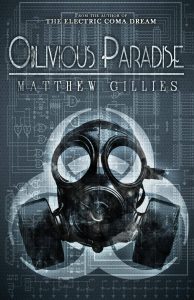 Mathew’s Sci-Fi Novel, a standalone sequel to a previous book he wrote.
Mathew’s Sci-Fi Novel, a standalone sequel to a previous book he wrote.
Is there other interests you have beyond writing?
I’ve always been a huge fan of art. Before I decided that writing was my passion, I dreamt of being a comic book artist. I would spend a lot of my time drawing characters and then as I was drawing the characters, I would create these stories for them… give them backstories and develop these long story arcs.
Eventually, I found it extremely difficult for me to draw. I was having a hard time translating what I saw in my mind onto the paper – so I started writing out what I saw… then I started creating the stories.
I still design, but now I do it through mixed-media design. I dabble in photo manipulations and design 3D characters to use for digital paintings and book covers.
Are there any influences or people you look up to for perusing writing?
I have quite a few influences but for me, most importantly are authors like Clive Barker, Neil Gaiman, H.P. Lovecraft, William Gibson and Chuck Palahniuk. Those writers have been a huge influence on me because their novels always took me to a fantastical world or presented me with great narrative.
Likewise! Clive Barker is a major inspiration for me. Thank you for your time to answer these questions to the readers! Any final comments about writing?
Read lots. Write lots. Don’t worry about whether people like what you’ve written or not. When I first sat down to write my first manuscript, it was because I wanted to write something I wanted to read. So for anyone serious about creating a writing career – don’t worry about what other people want to read… write what you want to read and you may be surprised by the fact that people are interested in that novel. I know I was after I released The Electric Coma Dream.
Thank you again Matthew for spending the time to discuss a bit about you and your writing. It was an enjoyable time to get to know your writing better. I look forward to finishing your novel and seeing what else you’ll conspire.
Cheers!
If you haven’t, you can check out Matthew’s work, you can find it on Amazon. Visit his Author Page to find out more information.
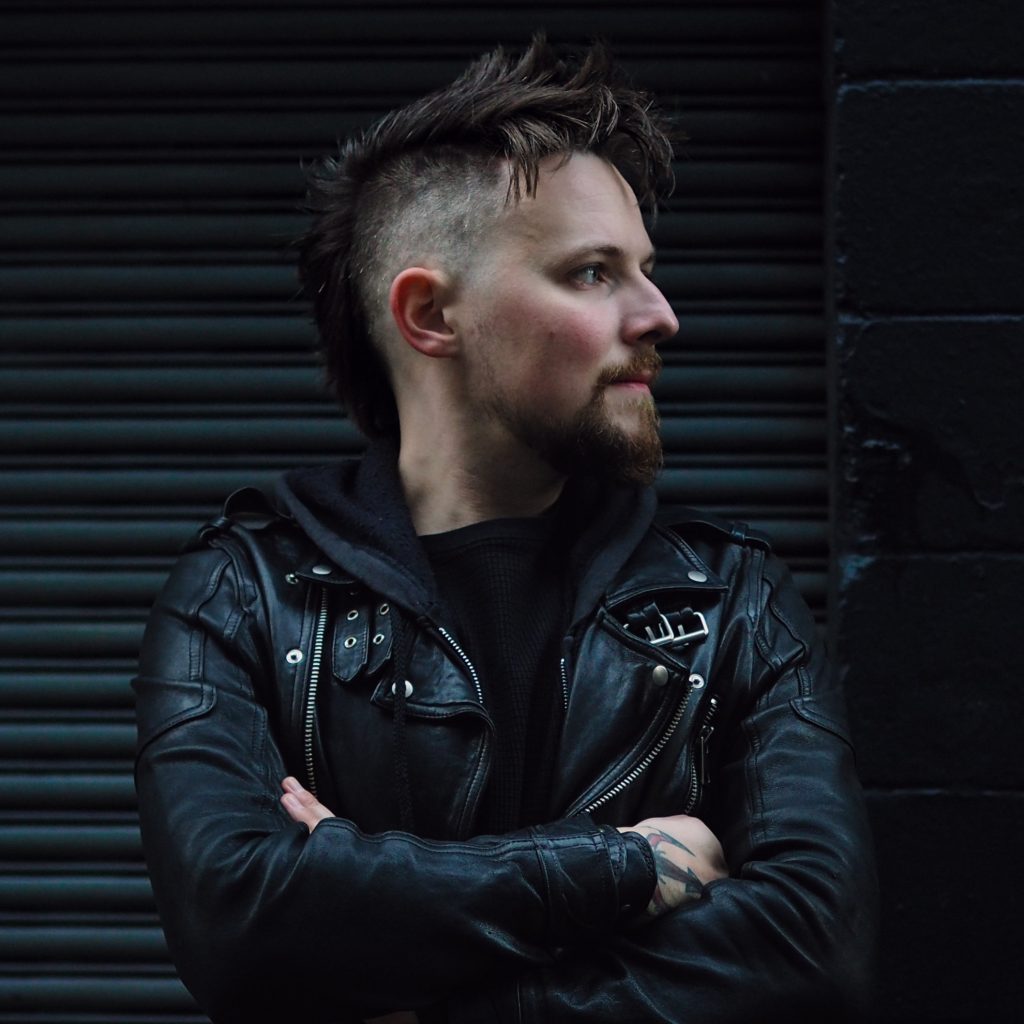
About Konn Lavery
Konn Lavery is a Canadian author whose work has been recognized by Edmonton’s top five bestseller charts and by reviewers such as Readers’ Favorite, and Literary Titan.


